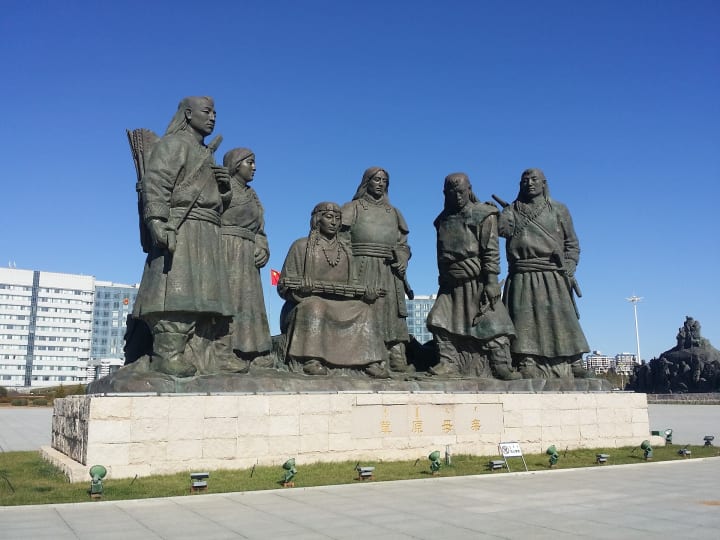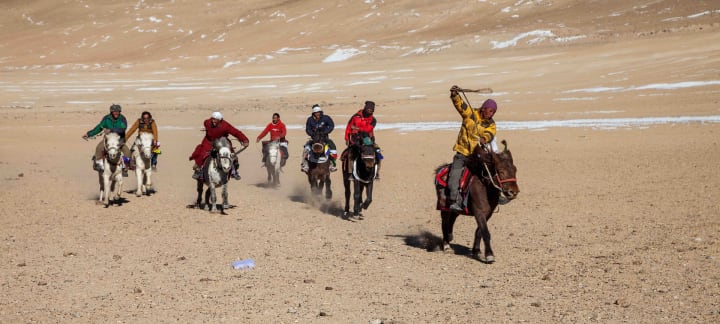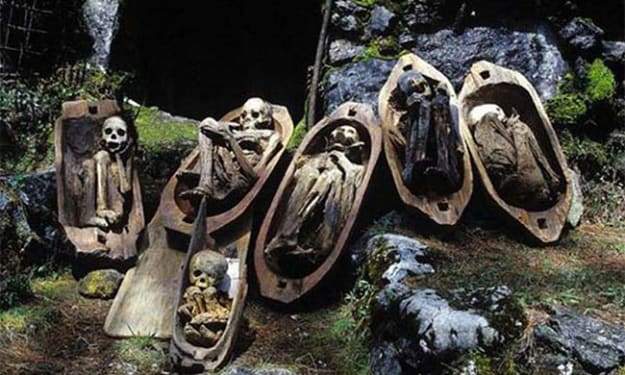
The Mongol Empire was one of the largest and most powerful empires in world history, spanning across vast areas of Asia and Europe in the 13th and 14th centuries. The Mongol warriors and their leader, Genghis Khan, are often remembered for their brutal and ruthless tactics, but they also played a significant role in shaping the course of world history.
Origin and Expansion of the Mongol Empire

The Mongol Empire was one of the largest and most influential empires in world history, spanning across Asia and into Europe during the 13th and 14th centuries. It was founded by Genghis Khan, who rose from humble beginnings in the Mongolian steppes to become one of the most powerful leaders in world history.
From Temujin to Genghis Khan
Born as Temujin in the late 12th century, Genghis Khan grew up in the harsh and rugged environment of Mongolia. Despite facing numerous challenges and setbacks, he gradually gained power and built alliances with other Mongol tribes. Eventually, he was able to unite the Mongol tribes under his leadership, earning him the title Genghis Khan, which means "universal ruler."
Conquest and Expansion
With the Mongol tribes united under his leadership, Genghis Khan launched a series of military campaigns that would come to define the Mongol Empire. He first turned his attention towards China, where he conquered the Khwarezmian Empire and established the Mongol hold over much of the region. From there, he expanded westwards, conquering territories in Central Asia and Eastern Europe.
The empire continued to expand even after Genghis Khan's death, with his sons and grandsons leading further conquests in Asia, Europe, and the Middle East. The empire's military prowess, combined with their efficient administration and communication systems, allowed them to maintain control over a vast region for several generations.
The Mongol Warrior Culture

The Mongol Empire was renowned for its highly skilled and formidable military forces, which dominated much of Asia and Europe during the 13th and 14th centuries. At the heart of this military power was the unique warrior culture that developed among the Mongol people.
Training and Discipline
From a young age, Mongol warriors were trained in the art of horsemanship and archery, skills that would come to define the Mongol military. These skills were honed through constant practice and grueling physical training, ensuring that each warrior was highly skilled and physically fit.
In addition to their physical training, Mongol warriors were also expected to adhere to a strict code of conduct, emphasizing bravery, discipline, and loyalty. This code was instilled in the warriors from a young age and was strictly enforced, making them some of the most effective and feared soldiers in the world.
Organization and Tactics
The Mongol military was organized into units of ten, a hundred, and a thousand, with each unit commanded by its own leaders. This organizational structure allowed for quick and effective communication and coordination on the battlefield, giving the Mongols a significant advantage over their enemies.
Mongol warriors were also known for their innovative tactics, including the use of feigned retreats to draw out enemy forces, as well as their highly effective use of the composite bow. This combination of organization, discipline, and tactics made the Mongol army a formidable force that few could stand against.
Legacy of the Mongol Warrior Culture
The Mongol warrior culture left a lasting impact on the world, influencing the development of military tactics and training across Asia and Europe. Its legacy can still be seen in the skills and disciplines that continue to be passed down among horseback riders and archers in Mongolia and other parts of the world.
Click here to discover
The Mongol Empire and Trade
The Mongol Empire, established in the 13th century, was one of the largest and most powerful empires in world history. While it is well known for its military conquests, the empire also had a significant impact on trade and commerce.
The Silk Road
One of the most notable contributions of the Mongol Empire to trade was the expansion and protection of the Silk Road, a network of trade routes that connected the East and West. Under Mongol rule, the Silk Road became safer and more accessible, allowing merchants to trade goods such as spices, textiles, and precious metals over long distances.
Encouraging Trade
The Mongol Empire also encouraged trade through its policies, such as granting tax exemptions to merchants and providing them with protection along the trade routes. This policy helped to create a thriving trade environment, attracting merchants from across the empire and beyond.
Diplomatic Relations and Trade Agreements
In addition to its domestic policies, the Mongol Empire also formed diplomatic relations and trade agreements with neighboring countries, further expanding its trade network. These agreements allowed for the exchange of goods and ideas, contributing to the growth and prosperity of the empire.
Legacy of Mongol Trade
The impact of the Mongol Empire on trade and commerce cannot be overstated. Its expansion and protection of the Silk Road, as well as its favorable trade policies, helped to create a thriving trade environment that greatly benefited merchants and contributed to the growth of the empire.
The Cultural and Religious Influence of the Mongols
The Mongol Empire, which stretched across vast territories in Asia and Eastern Europe, was known for its military conquests and administrative prowess. However, the empire also left a lasting impact on the cultures and religions of the lands it conquered.
Cultural Exchange
One of the most notable impacts of the Mongol Empire was the exchange of cultures and ideas. The empire brought together diverse populations from across its vast territories, promoting cultural exchange and integration. For example, the Mongols brought Chinese technology and advancements to the West, and introduced new styles of art and architecture.
Religious Tolerance
Another significant impact of the Mongol Empire was its policy of religious tolerance. Unlike many other empires at the time, the Mongols allowed their subjects to practice their own religions and did not enforce their own beliefs on others. This policy of religious tolerance allowed different beliefs
and practices to coexist, creating a diverse and inclusive society. Conversion to Buddhism While the Mongols were known for their policy of religious tolerance, some members of the empire, including members of the imperial family, eventually converted to Buddhism. This conversion helped to spread the religion across the empire, influencing the spiritual and cultural beliefs of the Mongol people.
Legacy of the Mongol Empire
The cultural and religious influence of the Mongol Empire can still be felt today in the regions that were once part of the empire. Its policy of religious tolerance and cultural exchange helped to shape the diverse and inclusive societies that exist in these areas, and its legacy continues to inspire future generations.
Click here to discover
The Decline and Legacy of the Mongol Empire
The Mongol Empire was one of the largest and most powerful empires in world history, stretching across vast territories in Asia and Eastern Europe. However, like all empires, the Mongol Empire eventually declined and fell. In this article, we will explore the reasons for the decline of the empire and its lasting legacy.
Causes of Decline
The decline of the Mongol Empire can be attributed to several factors, including internal political struggles, economic instability, and external pressures from neighboring powers. As the empire grew larger and more complex, it became increasingly difficult to govern and control its vast territories. Political struggles and economic instability weakened the empire, making it vulnerable to attack from outside forces.
Legacy of the Mongol Empire
Despite its decline, the Mongol Empire left a lasting legacy that continues to shape the world today. The empire was known for its administrative and military prowess, as well as its policy of religious tolerance and cultural exchange. These achievements helped to lay the foundation for future empires and civilizations, inspiring future generations to pursue similar goals.
Impact on History
The Mongol Empire had a profound impact on world history, shaping the political and cultural landscape of the regions it conquered. The empire helped to spread new technologies, ideas, and cultural practices, and its legacy can still be seen in the diverse and inclusive societies of today.
Conclusion
The Mongol Empire was one of the largest and most powerful empires in world history, leaving a lasting impact on the political, economic, and cultural development of the world. The Mongol warriors were skilled in battle and diplomacy, and their empire played a significant role in promoting trade and cultural exchange across Asia and Europe. The legacy of the Mongols can still be seen today, and their impact on world history is undeniable.
FAQs
Q : Who were the Mongols?
A : The Mongols were a group of nomadic tribes from the Central Asian Steppes who rose to power in the 13th and 14th centuries, creating one of the largest empires in world history.
Q : What was the Mongol Empire?
A : The Mongol Empire was a vast empire that spanned across vast areas
About the Creator
San Tosh
Hi, my name is San Tosh and I'm a 28 years old blogger. My blog mainly focuses on Parenting & family life but I also write about personal development, productivity, and lifestyle.






Comments
There are no comments for this story
Be the first to respond and start the conversation.